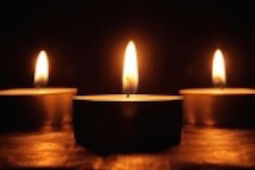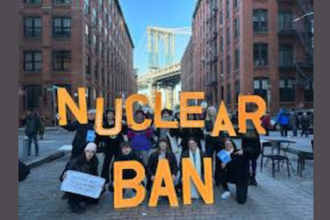Reflection: Loving the Stranger

Destructive policies, actions, and statements are all over the news these days. While this dismays and deeply disturbs many of us, maybe it is useful to try to see the glass half full.
Leaders around the world have gained power by relying on fear-mongering, hate-filled incitement, supremacy, and an encircling of the wagons in a laager or ghetto mentality while undermining both democracy and the world order established post-World War II.
Such subversion of critical agencies such as the United Nations, international law, organs of accountability, or basic civil rights forces us to choose the reality in which we function. We can either go with the masses down the dangerous road to full-fledged fascism, apartheid, and dictatorship, or we can step back and choose differently and fight for human values.
That freedom of choice is a blessing many do not enjoy, but for those of us who believe firmly in the spiritual way - whether via the wisdom of Judaism, Christianity, Islam, Buddhism or other religious doctrines valuing truth, love, freedom, goodness, empathy, caring (especially for the weak or The Other) and the sacred, holistic nature of life - this is a period in which to reclaim those values.
Humanity and the God-given environment, Mother Earth and the universe(s), which have been willed to us as treasured gifts, aren't geared for war, for killing or deliberate destruction. If they were, I suspect we'd be immune to Post-Traumatic Stress Syndrome, and our planet would be in less crisis.
As my late friend Kirsten Zaat Sjolander said in her thesis connecting human rights with neuroscience:
"In my human rights ontological research for my Ph.D., I have identified biological markers (drivers) that determine a community's success or otherwise. I propose that they underpin human rights in both theory and practice. They are a strong sense of personal autonomy tempered by a strong commitment to co-operation, reciprocity, fairness, empathy, and generosity. Communities that implement these innate biological drivers through an equally strong sense of individual responsibility and ongoing social sanctioning (i.e., robust accountability measures) thrive. Communities that do not simply die out in the interests of the survival of the species more broadly."
This view confirms that there's really only one successful modus vivendi available to us in life, as all major spiritual leaders have preached: via the heart. We must work on ourselves and within our communities to commit to seeing the other as ourselves, to dealing with the stranger with full humanity and caring. Otherwise, we doom ourselves in the long-term to a life barely worth living: as prisoners to fear and as people whose fear will create an ever-more fearful, dystopian reality. And we doom our planet, which can't sustain increasingly destructive wars, consumerism, wanton population explosion, and levels of greed which impoverish the majority while creating grotesque wealth for that 1%.
This means cultivating personal and highly aware freedom. To overcome our innate tendencies to automatic, robotic, conditioned response or unquestioning "obedience" to those who would dominate us.
To lift our spirits, consciously, so we may fight back effectively, and with full awareness, we need to seek that free centre, choosing not to remain passive or servile. We need to be more deeply responsive to our own needs and - equally - those of our entire communities. And to respond to those needs in more ways than simply "liking" a Facebook post, voting in elections, or avoiding discussion of the elephants in the room, with our heads ostrich-like in the sand.
It seems helpful to understand this place of choice: either we renege on our own human agency and fall in line with those whose self-interest neither cares for, nor sees, the plight of others --be they African Americans, Palestinians, Kurds, Yemeni children facing starvation or Latin American children forced into cages-- or we stand up together for those ancient, human values of democracy, of community, and higher values.
Each one of us impacts reality, alone or in communities. Once the heart is locked, loaded, and ready to go, we are more likely to experience blessings for ourselves and our neighbours, despite thorns on the path of humility and service.
Let us pray:
O Lord, grant me the loving power of your enlightenment and natural wisdom so that my choices fall easily into line with your teachings. May my heart and understanding extend with love to all those within my sphere, even my "enemies." And may I have the awareness that while others have their own lessons to learn from their experiences (and so I beware of falling into the trap of self-righteousness or superiority), we all have the power to transcend and heal those in need of the blessings of love and common caring, including - and starting with - ourselves.
Angela Godfrey-Goldstein is director of Jahalin Solidarity, a Palestinian non-profit she founded in order to support Jahalin Bedouin refugees, especially as to their forcible displacement, and to advocate against the Israeli Occupation. She was for many years Action Advocacy Officer with ICAHD - The Israeli Committee Against House Demolitions, and Advocacy Officer for Grassroots Jerusalem, having previously been an environmental activist in Sinai, Egypt, where she lived for four years. Together with Eid abu Khamis Jahalin she was a Rebuilding Alliance 2018 Peacemaker awardee.
A chapter about her work with Bedouin for the past 20 years was published in 2018 by Veritas in the best- selling book "Defending Hope" which brings together grassroots reports from Palestinian or Israeli human rights defenders, writing about how they keep hope alive.
This reflection, republished with permission, is part of a series from Churches for Middle East Peace. See: https://cmep.org/blog/p4p/?eType=EmailBlastContent&eId=bc67b9e1-a3e0-428a-b0a1-b627f50a5ff2

















